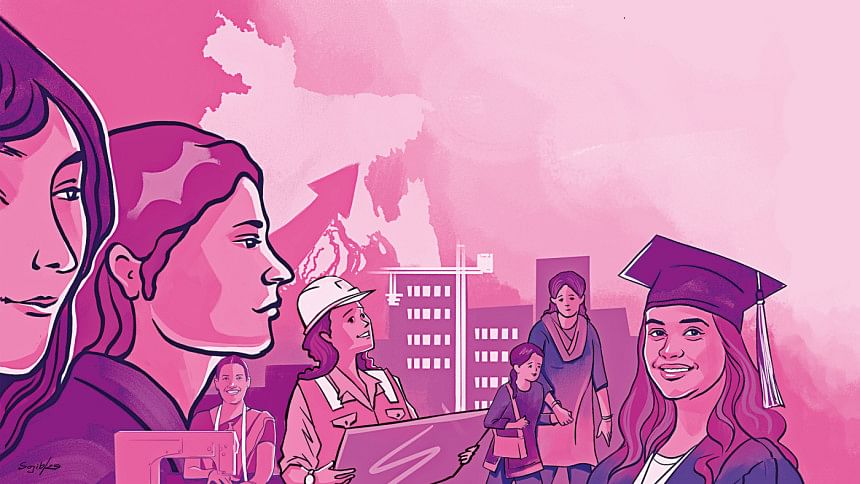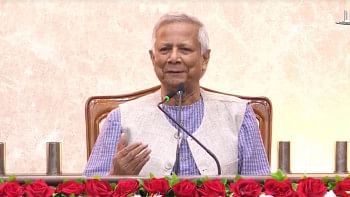Accelerate Action for all women and girls: rights. equality. empowerment

Women in Bangladesh have made significant strides in education, employment, and leadership, yet full equality remains out of reach. Despite progress, challenges such as wage disparities, underrepresentation in decision-making, and gender-based violence persist.
This year's International Women's Day theme, "For ALL Women and Girls: Rights. Equality. Empowerment," highlights the urgency of inclusivity. Bangladesh has strengthened gender equality through commitments like CEDAW and the Beijing Declaration, alongside national policies such as the Perspective Plan (2021-2041) and the National Women's Development Policy (2011).
While Bangladesh ranks 59th in the World Economic Forum's Gender Gap Index (2023), it stands 139th out of 146 in women's economic participation, revealing barriers to financial inclusion and leadership. Bridging these gaps through policy reforms, financial access, and workplace inclusion is essential for ensuring sustainable empowerment for women in Bangladesh.
Breaking Barriers in Economic Participation
"Bangladesh has progressed in gender equality through policies and legislation, but their effectiveness remains limited. Women's participation in decision-making is minimal, widening the gap in social and economic status," says Professor Muhammad Shahadat Hossain Siddiquee, an Economics Professor at the University of Dhaka.
While women's workforce participation has grown from 4% in 1974 to 43% in 2023 (BSS), men's participation remains at 80%, creating a significant gender gap. Women make up 2.59 crore of Bangladesh's 7.34 crore workforce, playing key roles in the garment industry, microcredit programs, and rural development.
"To overcome economic deprivation, women must engage in income-generating activities. Their participation is essential for empowerment, positioning them as decision-makers in society, ultimately benefiting the economy," says Professor Sanzida Akhter from the Department of Women and Gender Studies.
Prof. Sanzida's research highlights that women initiate businesses in times of crisis by taking loans, but control often shifts to male family members once businesses stabilize. Though women are the primary borrowers of microcredit, they often lack decision-making power over financial matters—yet remain responsible for repayment.
Financial Exclusion: The Biggest Hurdle
"Women's access to finance is crucial for economic growth. However, cultural traditions, gender barriers, and socio-economic norms place women at a disadvantage, making it difficult for them to compete with men in business and employment," says Fahria Huque, Head of Citygem Priority & City Alo Women Banking at City Bank.
The statistics reveal a clear gender disparity—women make up only 7% of the country's entrepreneurs and own just 15% of businesses. Alarmingly, only 1.7% of women-owned enterprises in Bangladesh are formally registered, far below the global average of 14.5%.
"Women's contributions often go unrecognized because many run unregistered businesses without licenses or tax records. Continuous research and data collection are necessary to track their participation and ensure economic inclusion," says Sangita Ahmed, Senior Vice President of BWCCI.
Women also struggle to secure loans. Banks frequently reject women's applications without proper explanation, adding to the barriers. "For true financial inclusion, banks must document rejections, clarify requirements, and adopt a more supportive approach," Sangita adds.
To narrow the gap, Bangladesh Bank mandates that 10% of CMSME loan portfolios be allocated to women entrepreneurs, with plans to increase this to 15% by 2024. Additionally, the Small Enterprise Refinance Scheme has expanded from BDT 850 crore to BDT 1500 crore, offering collateral-free loans up to BDT 25 lakh for women-led businesses.
"Women Banking has created a financial ecosystem where women from all economic backgrounds can thrive as entrepreneurs, professionals, and financially independent individuals," says Ali Reza Iftekhar, Managing Director and CEO, Eastern Bank.
Urban vs. Rural Disparities
Women's labor force participation is higher in rural areas than in urban centers, leading to higher unemployment and underemployment for urban women. Many are trapped in informal sectors with no job security, leaving them vulnerable to exploitation and workplace violence.
"Expanding rural transportation, digital infrastructure, and communication networks can help women access broader markets. Establishing economic zones for women entrepreneurs and strengthening institutions like BSCIC and the SME Foundation are critical," says Mousumi Islam, President of AGWEB.
Mousumi also highlights the urgent need for security, emphasizing that law enforcement must take a stronger role in protecting women in public spaces.
Security and Social Barriers
Security concerns remain a major issue for women entrepreneurs. Waresa Prity, founder of Her-e-Tread, highlights how political instability and rising gender-based violence are forcing many women to shut down their physical shops.
"The fear of mobility is growing, making it harder for women to sustain their businesses. Many have shifted to home-based e-commerce and f-commerce platforms, but these too face cultural barriers—from family approval restrictions to a lack of women-friendly workplace infrastructure," Prity explains.
A Roadmap for True Empowerment
To ensure true empowerment, societal norms must change. The government must enforce gender-sensitive policies, offer tax incentives for companies hiring women, and mandate female representation in leadership roles.
Education is key to economic empowerment. While Bangladesh has achieved gender parity in secondary education, it lags in tertiary education and STEM fields. Women make up only 14% of STEM professionals and 20% of IT employees.
The lack of daycare facilities and workplace harassment policies further discourages women from joining the workforce. Establishing safe working environments and anti-harassment mechanisms is crucial to retaining more women in the formal economy.
Reflecting on women's historical struggles, Dr. Fauzia Moslem, President of Bangladesh Mahila Parishad, states, "Women are called upon during movements, but once they end, they are sidelined. Each movement—whether in 1952, 1969, 1971, or 1994—pushed women forward. Now, women must actively claim their rightful place in society."
Women in Bangladesh are more educated, skilled, and active than ever before. However, true empowerment requires systemic change—acknowledging women's contributions, ensuring structural support for economic participation, and breaking cultural stigmas.
By implementing gender-sensitive policies, financial empowerment programs, and workplace safety measures, Bangladesh can ensure that gender equality is not just an aspiration, but a reality.

 For all latest news, follow The Daily Star's Google News channel.
For all latest news, follow The Daily Star's Google News channel. 



Comments